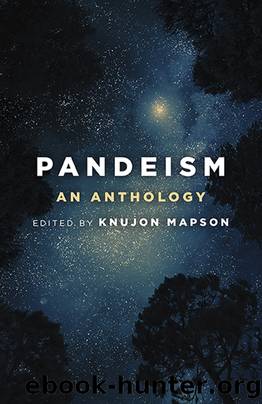Pandeism: An Anthology by Knujon Mapson

Author:Knujon Mapson [Mapson, Knujon]
Language: eng
Format: epub
Publisher: Iff Books
Published: 2017-01-26T16:00:00+00:00
3. A New Approach
We cannot say what trade-off among speed, payload, and other factors should characterize an airplane unless we know its mission. However, given an existent airplane, we could write down the combination of design requirements that it would need for some specified mission and then test to see if it had that combination of qualities. If the fit were excellent, we might reasonably conclude that its designers had intended it for that mission. If we take this approach, our initial hunch about the airplane’s purpose need not derive from anything except personal belief. As with any scientific hypothesis, it “may initially be put forward for aesthetic or metaphysical reasons, but the real test is whether it makes predictions that agree with observation” (Hawking 1998, pp. 141–2). We can follow this same approach with our existent universe.
If, as Leibniz thought, our world began with God, then its mission or purpose must flow out of the value (or values) that motivated God to actualize it. Since that value must reflect God’s nature, we should be able to frame a testable claim about the world’s physical structure by considering God’s nature. This is just what Leibniz thought. He said, “It is sanctifying philosophy to make its streams flow from the fountain of God’s attributes. Far from excluding final causes and the consideration of a being acting with wisdom, it is from there that everything must be deduced in physics” (2006, pp. 131–2).
Any serious reflection on God’s nature must consider this profound comment from the philosopher Nikolai Berdyaev:
Can God be said to have no inner life, no emotional and affective states? The static conception of God as actus purus…is a philosophical, Aristotelian, and not a biblical conception. The God of the Bible, the God of the revelation, is by no means an actus purus: He has affective and emotional states, dramatic developments in His inner life, inward movement—but all this is revealed exoterically. It is extraordinary how limited is the human conception of God. Men are afraid to ascribe to Him inner conflict and tragedy characteristic of all life, the longing for His “other,” for the birth of man, but have no hesitation in ascribing to Him anger, jealousy, vengeance and other affective states which, in man, are regarded as reprehensible…We can only think of God symbolically and mythologically. And a symbolic psychology of God is possible—not in relation to the Divine Nothing of negative theology, but in relation to God-the-Creator of positive theology.
(1937, pp. 37–8)
Download
This site does not store any files on its server. We only index and link to content provided by other sites. Please contact the content providers to delete copyright contents if any and email us, we'll remove relevant links or contents immediately.
Becoming Supernatural by Dr. Joe Dispenza(7106)
Tools of Titans by Timothy Ferriss(6948)
The Witchcraft of Salem Village by Shirley Jackson(6584)
Inner Engineering: A Yogi's Guide to Joy by Sadhguru(5897)
The Four Agreements by Don Miguel Ruiz(5511)
The Power of Now: A Guide to Spiritual Enlightenment by Eckhart Tolle(4755)
The Wisdom of Sundays by Oprah Winfrey(4626)
Room 212 by Kate Stewart(4107)
Fear by Osho(4085)
Pale Blue Dot by Carl Sagan(4001)
The David Icke Guide to the Global Conspiracy (and how to end it) by David Icke(3883)
Rising Strong by Brene Brown(3781)
Animal Frequency by Melissa Alvarez(3755)
How to Change Your Mind by Michael Pollan(3679)
Sigil Witchery by Laura Tempest Zakroff(3652)
Real Magic by Dean Radin PhD(3569)
Secrets of Antigravity Propulsion: Tesla, UFOs, and Classified Aerospace Technology by Ph.D. Paul A. Laviolette(3450)
The Art of Happiness by The Dalai Lama(3384)
Man and His Symbols by Carl Gustav Jung(3315)
